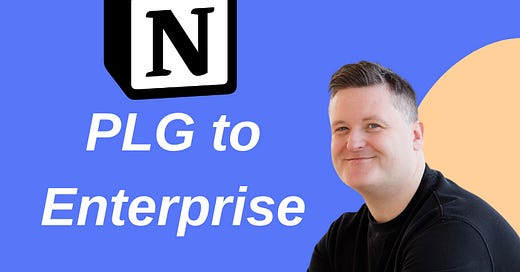Notion's Journey From PLG To The Enterprise: Robbie O'Connor
Penetrating Enterprise Whilst Staying True To Your Core
👋 Hey friends, I’m Akash! Software Synthesis is where I connect the dots on software and company building strategy. You can reach me at akash@earlybird.com!
Today we’re speaking to Robbie O’Connor about Notion’s journey upmarket into the enterprise. Last valued at $10 billion, Notion has its sights set on winning the productivity software market. Notion is the archetypal PLG success story, having built an enviable bottoms-up community foundation (which we discussed previously with Ben Lang) that has helped pave the way into the enterprise world.
Robbie is the General Manager of Notion in EMEA. He’s a seasoned tech leader with extensive experience in scaling high-growth SaaS companies. After starting his career at Microsoft and Google, Robbie held leadership roles managing international expansion at Asana and Dropbox through successful IPOs. Since joining Notion in 2020, he has overseen its business in EMEA, driving the company’s go-to-market strategy across multiple countries and leading its regional headquarters in Dublin, Ireland.
At what point did Notion decide to actively pursue an enterprise motion, and what signals did you consider when deciding the right time?
Notion's core has always been our consumer approach. Notion is loved by startups, scale-ups, and small businesses. We meet many needs for smaller businesses generating and storing information. Our move towards large enterprise customers was a natural evolution in our growth.
We saw increasing demand from larger organisations already using Notion through bottom-up adoption. Key signals triggered us to consider building for bigger organisations: there were many enterprise-level feature requests and a clear need for more security and compliance capabilities.
The shift allowed us to better serve these customers while maintaining our commitment to our core user base. It's challenging to build for end users while ensuring Notion is scalable within large organisations across different matrices.
What were the key product requests or changes you made to meet enterprise-grade requirements? How did you balance those with the features core to Notion's initial bottom-up love?
Notion progressed from a cluster of users within a company to a team, then several teams, then whole divisions. Soon, we were speaking with IT leaders or C-suite members who saw the product's value within their teams and core workflows.
In fact, today, 50% of the Fortune 500 companies use Notion.
We focused on enhancing security features, improving user management capabilities, and developing advanced collaboration tools. The key was implementing these features without complicating the user experience. Notion's beauty is its simplicity and intuitive nature. We made enterprise features optional and easily accessible when needed, while preserving the intuitive interface that made Notion popular.
Sidebar: visit Enterprise Ready for more info on enterprise-grade features.
One thing commonly associated with Notion is the ambassador program (including consultants for onboarding and training).
From an enterprise perspective, how has the ambassador program helped bridge the gap between self-serve adoption and enterprise uptake, considering the lower training costs associated with rolling Notion out?
Notion's community is very vibrant. Our early focus on connecting with users and maintaining strong two-way communication has led to users building our product with us.
We now have over a million community members and the largest subreddit.
Our ambassador program has been instrumental in bridging the gap from our self-service business to our growing enterprise business. Community members often understand Notion deeply, figuring out functionalities we haven't even discovered. Many larger customers employ community members as consultants for onboarding and training, significantly reducing enterprise clients' ownership costs.
This organic process helps new users become proficient with Notion quickly, accelerating adoption and maximising value for organisations. CTOs and technology buyers want to minimise shelfware, and high adoption and utilisation are key. This program has been particularly effective in EMEA, where we've seen strong growth in our enterprise product and adoption.
In addition to ambassadors and engaged users, templates are another component of activation.
How have templates and other community-produced artefacts become assets in enterprise sales?
Users take pride in generating templates for their work processes and love sharing them. For almost any task in Notion, there's likely a template available.
The community has been a tremendous asset in our upmarket move. The wealth of templates and use cases showcases Notion's versatility and potential to enterprise customers. In sales conversations, we often reference how other companies creatively use Notion, which resonates with potential enterprise customers. The community's enthusiasm serves as a powerful testimonial to Notion's value proposition. This synergy is very helpful for our sales team.
Regarding the sales team, I assume you've built a sales assist model for larger enterprise clients. How does this align with your continued PLG strategy?
We have a unique B2C2B model at Notion. We need to maintain a strong consumer-oriented brand while building a B2B model ranging from small organisations to the largest enterprises. It's challenging but exciting if you're a fan of business and growth.
Our sales-assist model complements our product-led growth strategy by providing additional support where needed. We often see small teams within large organisations start using Notion. As usage grows, we engage with decision-makers to explore enterprise-wide adoption. For example, a team of developers might start using Notion for project management, which then expands to several departments, eventually leading to company-wide implementation.
Our sales team now includes customer success and professional services elements. We have a channel team for onboarding new partners and growing our ecosystem. We're handling large opportunities with bigger companies executing change management by deploying Notion at scale.
It's been quite a journey over my four years at Notion, tackling these pieces while maintaining our core strengths. We continue to focus on areas we know will be important for the future.
The evolution from consultants to system integrators suggests deep penetration into Fortune 500 enterprise budgets, which are often slower to adopt.
We're looking forward to it. The ecosystem continues to strengthen, which is exciting. Each country in Europe and APAC has different operating styles, partners, and cultural nuances in how larger companies perceive value. Translating this back to headquarters has been an interesting regional strategy challenge.
The localisation aspect of channel probably deserves its own discussion - for another day!
Regarding enterprise tiers and pricing and packaging, how has that evolved to fit enterprise needs?
We consider our pricing and packaging frequently.
We've introduced flexible enterprise pricing tiers catering to larger organisations' specific needs. These tiers include additional features like advanced security controls, dedicated support, and custom contract terms. However, we've maintained transparency in pricing and continue to offer our core product at competitive rates for individuals and smaller teams. It's a constantly evolving process, ensuring our tiers are clear and flexible for different types of organizations.
What organisational changes were required as you built out the enterprise sales muscle? What new roles were created?
Building enterprise sales capabilities required new roles and retraining existing teams. We introduced account executives a few years ago, segmenting them into smaller, medium, and larger segments to handle different deal cycles.
Our customer success team evolved from a one-dimensional support team to specialised groups including onboarding, pooled resources for high-potential companies, and dedicated resources for specific customer needs. We've added a professional services organization and development teams focused on pipeline generation.
We closely partner with our marketing team, which has expanded from brand marketing to include product marketing and B2B-focused marketing. It's been an exciting evolution.
As you move upmarket while maintaining value for your B2C2B motion, what do you see as further unlocks in this journey?
We see potential in all our segments. Like any company at our stage, we understand that most segments need to perform well, or we need a few to be particularly strong. We're still determining our exact focus, but currently, we're betting equally on each segment.
We see significant growth potential in our enterprise business, particularly in EMEA. Our priorities include enhancing enterprise-grade features, expanding our partner ecosystem, and continuing to innovate for both large organisations and individual users. We're committed to maintaining the flexibility and ease of use that made us popular while adding the rigour and robustness that enterprises require.
Looking back at your experience taking a PLG company upmarket, what advice would you give to founders?
If you're fortunate enough to have a scaling product with traction, I'd advise investing earlier in building out B2B support infrastructure. As companies mature, their needs change. We occasionally lacked proximity to these customers or sufficient international team scaling to understand their requirements.
Your product needs to be deeply embedded in an organization to survive potential cost-cutting measures. Notion is popular, but popularity needs to become crucial quickly.
We did well, but there's always room for improvement.
My advice to PLG founders would be to prepare for enterprise customers earlier in their journey. This includes product features and building necessary sales, support, and success teams. Crucially, maintain your product philosophy's core values that drove initial success. The key is evolving your offering without losing sight of what made your product special.
It's challenging because there's burn involved.
Exactly. You need executive-level buy-in because the ROI isn't immediate. Some B2B support investments only yield returns after two or three years.
We've had scenarios where we hesitated to add roles. We've gone through similar situations at Notion, questioning decisions and realising the benefits of dedicated resources.
Notion seems to have been thoughtful about growth, scaling at a pace you could digest
Efficiency comes in many forms – from optimising existing functions to investing in areas needing support. Often, it's not visible things, but data, systems, or infrastructure. Every team experiences this. It's challenging when you're handling numerous tasks as a founder or C-suite member in a scaling organization. Understanding what to prioritize is a crucial skill.
Thank you for reading. If you liked this piece, please share it with your friends, colleagues, and anyone that wants to get smarter on startup strategy. Subscribe and find me on LinkedIn or Twitter.





